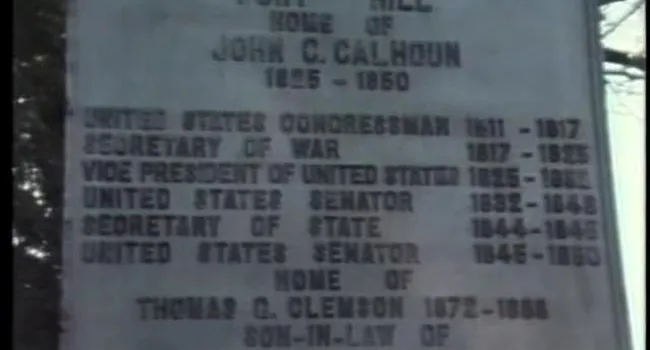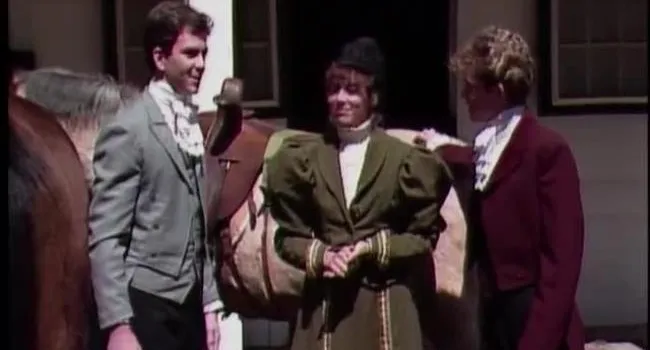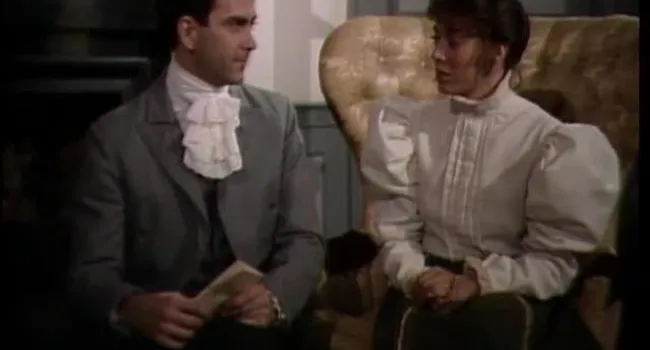The "Palmetto Special" leaves Columbia and travels to Spartanburg County. At the beginning of the program the Fall Line is defined, along with an introduction to the backcountry, the frontier of South Carolina. Walnut Grove Plantation is highlighted and the fate of the Requlator movement is discussed.
REENACTMENT: George and Emma Carter, along with their son, Michael, have migrated from Virginia to the backcountry of South Carolina, as had many others in the area. They become victims of a crime wave. George, a Regulator, along with other Regulator neighbors, captures and punishes the culprits. Subsequently, charges are filed against George for taking the law into his own hands and he is summoned to Charleston to stand trial.
BACKGROUND: From its earliest colonial days South Carolina had developed a flourishing trade with the Indians. This business flourished particularly with the Cherokees. Deerskins, the Cherokee Indians' prime objects of trade, were a favored commodity both in Charleston as well as in England. The Indians particularly liked to receive clothing, firearms and liquor. Many of the Indians around Carolina became quite accustomed to English goods.
South Carolina was a leader among the colonies in the extent of trade with the Indians. Various names have been applied to those engaged in this business. A principal trader was generally an intelligent well respected businessman A pack-horseman operated on a lower level. He also carried goods to the "factories" or interior "warehouses," in addition to some direct dealing with the Indians. There were laws and government agencies to oversee this trade, but frequently, unscrupulous traders would cheat the Indians and isolated trouble spots would flare up.
The Indians had developed a rather sophisticated network of trails and paths and the traders used these heavily on their trips to the interior Perhaps the most heavily traveled of these was the Cherokee Path, connecting Charles Town with Keowee, the main town of the Lower Cherokees. In 1754 the French, still quite hopeful of gaining much of the North American continent for themselves, allied with a number of northern Indian tribes and began a war that would rage spasmodically until their defeat with the signing of the Treaty of Paris in 1763. The French and Indian War had an adverse affect on the heretofore good relations between the Cherokees and the colonists in Carolina. This led to open hostilities in 1760. The Cherokee War in South Carolina was part of the French and Indian War. It resulted in a crushing defeat for the Cherokees.
Standards
- 4.1.CX Contextualize the experience of Africans, Europeans, and Native Americans in South Carolina.
- 4.1.CE Identify the effects of changing economic systems on the diverse populations in British North America.
- 4.1.CC Identify patterns of change and continuity in the development of economic systems in British North America.
- 8.1.CO Compare the three British North American colonial regions economically, politically, socially, and in regard to labor development.
- This indicator was developed to encourage inquiry into how the three British colonial regions developed in terms of their culture, economies, geography, and labor. The indicator was also developed to encourage inquiry into the unique story of the development of South Carolina.
- 8.1.CE Analyze the factors that contributed to the development of South Carolina’s economic system and the subsequent impacts on different populations within the colony.
- This indicator was designed to encourage inquiry into the geographic and human factors that contributed to the development of South Carolina’s economic system. This indicator was also written to encourage inquiry into South Carolina’s distinct social and economic system as influenced by British Barbados.
- 8.1.CC Analyze the changes and continuities of the Native Americans' experiences prior to and as a result of settlement and colonization.
- This indicator was developed to encourage inquiry into Native American civilizations and cultures prior to European contact and their interactions with Europeans during the period of settlement and colonization, including their efforts to preserve their cultures.










































